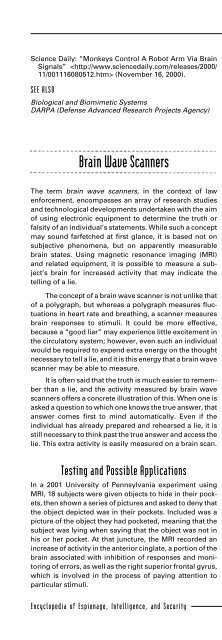ENCYCLOPEDIA OF Espionage, Intelligence, and Security Volume ...
ENCYCLOPEDIA OF Espionage, Intelligence, and Security Volume ...
ENCYCLOPEDIA OF Espionage, Intelligence, and Security Volume ...
You also want an ePaper? Increase the reach of your titles
YUMPU automatically turns print PDFs into web optimized ePapers that Google loves.
Brazil, <strong>Intelligence</strong> <strong>and</strong> <strong>Security</strong>Science Daily: “Monkeys Control A Robot Arm Via BrainSignals” (November 16, 2000).SEE ALSOBiological <strong>and</strong> Biomimetic SystemsDARPA (Defense Advanced Research Projects Agency)Brain Wave ScannersAfter the September 11, 2001, terrorist attacks, anumber of government agencies began to take a new lookat brain scanning technology as a means of security screening.In 2002, officials of the National Aeronautics <strong>and</strong>Space Administration reportedly informed airline officialsthat they were developing brain-monitoring technologyfor use in screening airline passengers. Such activity,along with an increase of interest in brain-wave scanningby the Federal Bureau of Investigation, has raised concernsamong civil-liberties groups, which view brain-wavescanning as a particularly objectionable invasion of privacyin the service of public security.The term brain wave scanners, in the context of lawenforcement, encompasses an array of research studies<strong>and</strong> technological developments undertaken with the aimof using electronic equipment to determine the truth orfalsity of an individual’s statements. While such a conceptmay sound farfetched at first glance, it is based not onsubjective phenomena, but on apparently measurablebrain states. Using magnetic resonance imaging (MRI)<strong>and</strong> related equipment, it is possible to measure a subject’sbrain for increased activity that may indicate thetelling of a lie.The concept of a brain wave scanner is not unlike thatof a polygraph, but whereas a polygraph measures fluctuationsin heart rate <strong>and</strong> breathing, a scanner measuresbrain responses to stimuli. It could be more effective,because a “good liar” may experience little excitement inthe circulatory system; however, even such an individualwould be required to expend extra energy on the thoughtnecessary to tell a lie, <strong>and</strong> it is this energy that a brain wavescanner may be able to measure.It is often said that the truth is much easier to rememberthan a lie, <strong>and</strong> the activity measured by brain wavescanners offers a concrete illustration of this. When one isasked a question to which one knows the true answer, thatanswer comes first to mind automatically. Even if theindividual has already prepared <strong>and</strong> rehearsed a lie, it isstill necessary to think past the true answer <strong>and</strong> access thelie. This extra activity is easily measured on a brain scan.Testing <strong>and</strong> Possible ApplicationsIn a 2001 University of Pennsylvania experiment usingMRI, 18 subjects were given objects to hide in their pockets,then shown a series of pictures <strong>and</strong> asked to deny thatthe object depicted was in their pockets. Included was apicture of the object they had pocketed, meaning that thesubject was lying when saying that the object was not inhis or her pocket. At that juncture, the MRI recorded anincrease of activity in the anterior cinglate, a portion of thebrain associated with inhibition of responses <strong>and</strong> monitoringof errors, as well as the right superior frontal gyrus,which is involved in the process of paying attention toparticular stimuli.Encyclopedia of <strong>Espionage</strong>, <strong>Intelligence</strong>, <strong>and</strong> <strong>Security</strong>❚ FURTHER READING:PERIODICALS:Feder, Barnaby J. “Truth <strong>and</strong> Justice, By the Blip of aBrainwave.” New York Times. (October 9, 2001): F3.Vedantam, Shankar. “The Polygraph Test Meets Its Match.”Washington Post. (November 12, 2001): A2.Wright, Karen. “Go Ahead, Try to Lie.” Discover. 22, no. 7(July 2001): 21–22.Young, Emma. “Brain Scans Can Reveal Liars.” New Scientist.(November 12, 2001).SEE ALSOBrain-Machine InterfacesElectromagnetic PulsePolygraphsBrazil, <strong>Intelligence</strong><strong>and</strong> <strong>Security</strong>Brazil gained its independence from Portugal in 1822,seizing upon a period of European unrest to establish itsown government. Since that time, the government ofBrazil has been traditionally unstable, with large-scalel<strong>and</strong>owners, the military, <strong>and</strong> democratic forces vying forpolitical power.A military coup took control of the nation for much ofthe late twentieth century, but civilians regained control ofthe government in 1985. Under military rule, politicaldissidents were taken into custody <strong>and</strong> sometimes tortured.The government used the intelligence services toconduct surveillance of citizens <strong>and</strong> infiltrate political organizations.The regime also imposed strict censorship. In1989, Brazil had its first free elections in three decades.Seeking to distance the new government from the legacyof its predecessors, sweeping reforms were made to141







![The Big Lie 9-11 and Government Complicity in Mass Murder [PDF]](https://img.yumpu.com/50957077/1/190x245/the-big-lie-9-11-and-government-complicity-in-mass-murder-pdf.jpg?quality=85)








